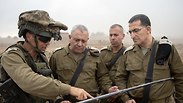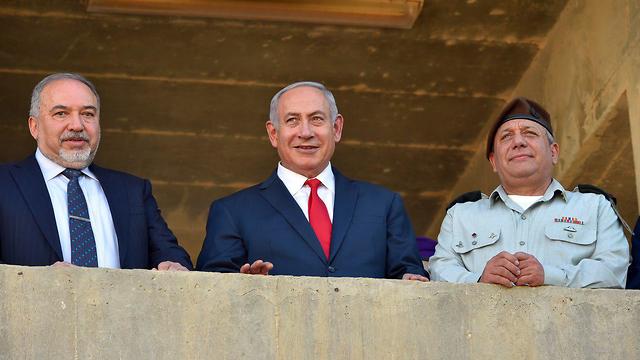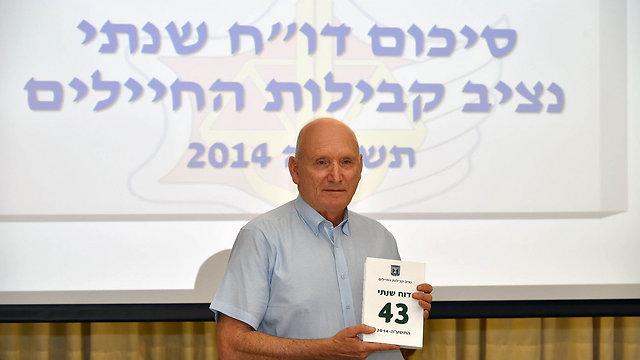
Golani Brigade training
צילום: דובר צה"ל
IDF asserts its preparedness for battle
Op-ed: In the past, the IDF was caught off guard as vehicles were immobilized, emergency stores neglected and field and air training cancelled due to budget constraints. However, now the military is implementing a multi-year plan, training has resumed vigorously and emergency supplies replenished.
Forty-five years after that war, every Israeli asks themselves whether the IDF is at a level of fitness suitable for war. The public has reason to be confused: Is the army fit and ready, as determined in a document prepared by the IDF top brass and signed by Chief of Staff Gadi Eisenkot, or is the situation as bad and worrying as an opposing document, shows?
The more pessimistic document was issued by the IDF Ombudsman Maj. Gen. (res.) Yitzhak Brick, a medal of courage recipient from the Yom Kippur War, calls for the establishment of an external commission of inquiry to examine the IDF’s preparedness for war.
In January, when his term ends, Brick will have served as ombudsman for a decade. During that time it was possible, and even vital, to compose far more serious reports about the IDF and its preparedness for battle, but he did not do so.
Thus, during Operation Pillar of Defense, dozens of battle tank carriers became stuck on their way to the Gaza front. The military censor banned publication of the incident until new trucks were purchased, but it became clear that the state of the trucks was catastrophic and they would be unusable in any future war.
Another example is the two years preceding Operation Protective Edge, in the summer of 2014. Training was stopped twice due to budget constraints, including Air Force training flights. The IDF ceased training.
Maj. Gen. Amir Eshel, commander of the air force at the time, warned against harming the pilots' level of fitness. Brigade and battalion commanders warned that their units were not training enough. The emergency stores were neglected. Many non-commissioned officers were let go and those that stayed lacked motivation due to the low pay. The results became apparent during Operation Protective Edge.

Defense Minister Lieberman, PM Netanyahu, Chief of Staff Eisenkot watch officers graduation (צילום: אריאל חרמוני, משרד הביטחון)
During that period, the tenure of former chief of staff Benny Gantz, the IDF did not have a multi-year plan to strengthen and build its force, and that is a serious matter.
Did the ombudsman then call for the establishment of an external commission of inquiry to examine the IDF's readiness? Why is it happening now and not then?
Raising these questions does not eliminate the need for the ombudsman’s criticism, which should not be taken lightly.
The matters raised by the report were important and raised warning flags for the chief of staff and the defense minister: the problem of motivation among the fighters, the brain drain to the civilian market, the budget constraints in the ground forces, and more. But in the operational sphere, according to measures that can be examined, there has been a significant improvement that cannot be denied.
Not only does the IDF have a multi-year plan, it was also fully implemented. The regular divisions returned to training as they had not done since 2000. The ground forces received an additional NIS 1.5 billion each year. The emergency stores were replenished.
The IDF's smart bomb inventory is the highest it’s ever been. On the level of the individual too, much has been improved, as every fighter knows — and every parent of a fighter — who receives state-of-the-art equipment for the duration of his service.
The situation was catastrophic. This is not the case today, even though there are other matters that still require improvement.
So why is it now that the ombudsman cries out in warning?
I will conclude with a personal story: On Sunday I met with officers from a platoon commander’s course for a talk, without the presence of their commander. I asked them about the harsh report on the state of the IDF’s readiness. Maybe they lack equipment? Maybe training is problematic?
No one complained; on the contrary. I heard the same from battalion and brigade commanders. When they find it difficult, they know how to complain, and the archives bear witness.
This is not the case. So maybe they all lied, and not only to me — but to their commanders, to the generals and to the chief of staff who signed the readiness document; but only to the ombudsman did they told the truth, but maybe not.
The task to ensure the IDF’s readiness is ultimately the responsibility of the chief of staff and the rest of the IDF commanders. If we do not believe them, we can shut down the country.











